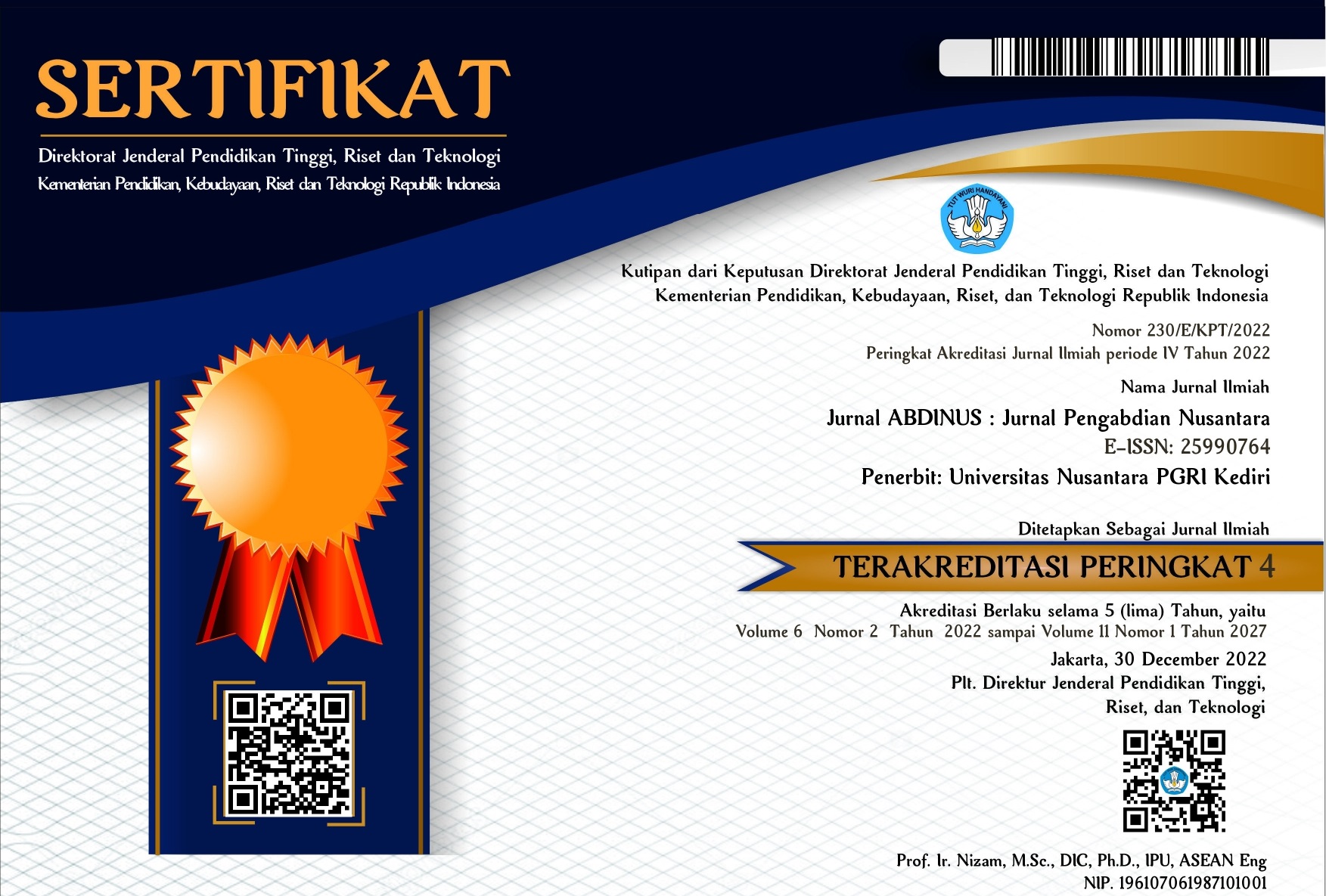Media Edukasi Kartu Bergambar untuk Memilah Sampah pada Siswa PAUD Srikandi
DOI:
https://doi.org/10.29407/ja.v6i2.16892Keywords:
Communication media, Education, Sorting Trash, Children, FlashcardAbstract
Environmental communication has shifted to the concept of Sustainable Development Goals (SDGs) or Sustainability Communication. Data from the Ministry of Environment and Forestry (KLHK) in 2019, Indonesia produces at least 64 million tons of waste piles every year. Based on this data, about 60% of the waste is transported and dumped to the final dump, 10% of the waste is recycled, and the remaining 30% is not managed. In fact, the government has a target in 2025 that waste must be managed 100%. The solution that we can provide as academics in the field of Communication Science is to help teacher to educate their students what is meant by "Throwing garbage in its place". We will design educational media for children as the output of this activity in the form of flashcards that can be used by schools to educate students in sorting organic, non-organic and B3 waste (hazardous and toxic materials). This card is played in groups so that students' knowledge can be measured. The interaction that is built is also quite good between the teacher and students because all children can be controlled in small groups (containing 4-5 people) and have their turn to play cards. The results of the activity proved to be able to increase students' knowledge because the final test results obtained an average of 69.18. So, flash cards effective as an educational medium for sorting waste for ECED students.
Downloads
References
Garnesia, I. (2018, February 20). Mengintip Kota-Kota Gudang Sampah di Indonesia. Tirto.Id. https://tirto.id/mengintip-kota-kota-gudang-sampah-di-indonesia-cE4o
Hamer, W., & Rohimajaya, N. A. (2018). Using Flash Card as Instructional Media to Enrich the Students’ Vocabulary Mastery in Learning English. Journal of English Language Studies, 3(2), 167. https://doi.org/10.30870/jels.v3i2.3875
Hermawan, B. (2021, February 27). KLHK Dorong Bank Sampah Sumber Bahan Baku Industri. Republika.Co.Id. https://www.republika.co.id/berita/qp5ekb354/network
Katadata. (2019, Desember). Pilah Sampah Jadi Berkah. Katadata.Co.Id. https://katadata.co.id/timpublikasikatadata/infografik/5e9a4c4914ffa/pilah-sampah-jadi-berkah
Kementerian PPN/BAPPENAS. (2017). Buku Saku Terjemahan Tujuan dan Target Global.
Maslakah, N., & Setiyaningrum, Z. (2017). Pengaruh Pendidikan Media Flashcard Terhadap Pengetahuan Anak Tentang Pedoman Umum Gizi Seimbang di SD Muhammadiyah 21 Baluwarti Surakarta. Jurnal Kesehatan, 10(1), 8.
Selviyanti, S. S., Ichwanuddin, I., Judiono, J., Suparman, S., & Tiara, D. N. (2019). PENYULUHAN GIZI DENGAN MEDIA FLASHCARD TERHADAP PENGETAHUAN PESAN UMUM GIZI SEIMBANG PADA SISWA SEKOLAH. Jurnal Riset Kesehatan Poltekkes Depkes Bandung, 11(2), 82. https://doi.org/10.34011/juriskesbdg.v11i2.674
Sumartiningtyas, H. (2020, Desember). Indonesia Hasilkan 64 Juta Ton Sampah, Bisakah Kapasitas Pengelolaan Tercapai Tahun 2025? Kompas.Com. https://www.kompas.com/sains/read/2020/12/18/070200023/indonesia-hasilkan-64-juta-ton-sampah-bisakah-kapasitas-pengelolaan?page=all















